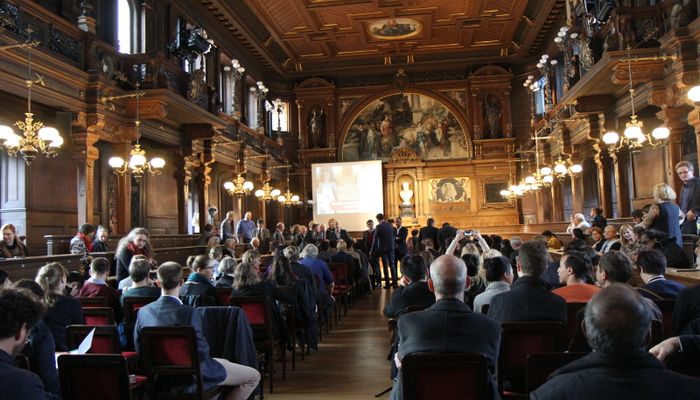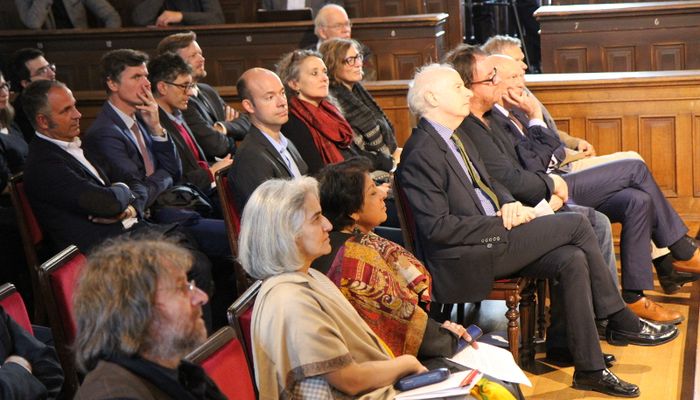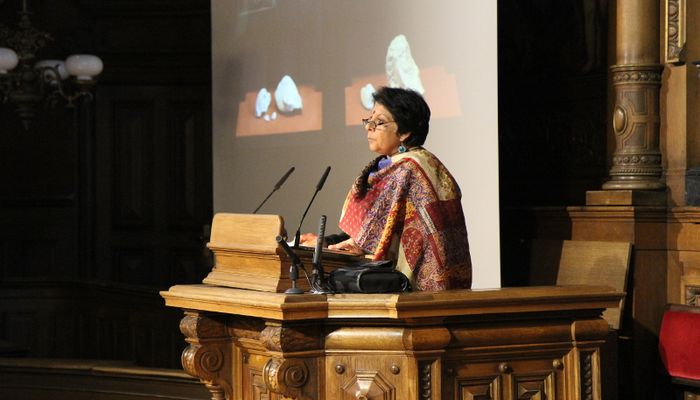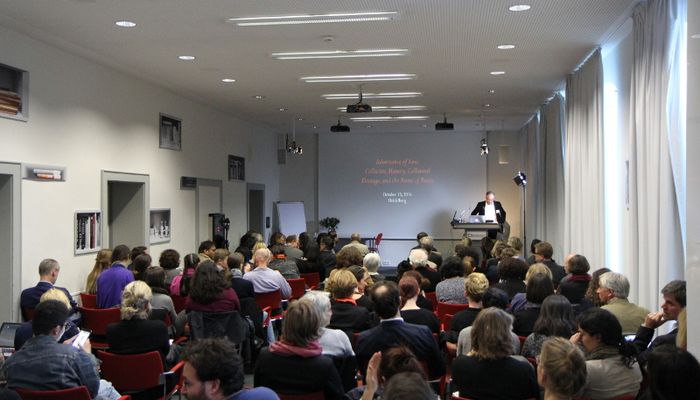Monica Juneja über die Politisierung kulturellen Erbes (Deutschlandfunk)
Introductory Remarks to the Conference
»Das eine ist die Ästhetik, das andere der historische Wert« – Interview mit Katharina Steudtner
»On Heritage, Culture and Trading Zones« (William Carruthers)
Concluding remarks to the Conference »Making, Sustaining, Breaking – The Politics of Heritage and Culture«
»I am interested in the contentious aspects of history, too« – Interview with William Carruthers
»Heritage occurs in a larger context of identity formation« – Conversation with Annalisa Butticci and Birgit Meyer
Follow up event in 2017, Bode-Museum: “Negotiating Cultural Heritage”
Making, Sustaining, Breaking – The Politics Of Heritage And Culture
Forum Transregionale Studien, Max Weber Stiftung, Cluster Asia and Europe in a Global Context (Universität Heidelberg), Deutsches Archäologisches Institut
Universität Heidelberg, Karl Jaspers Centre for Advanced Transcultural Studies, Voßstraße 2, 69115 Heidelberg
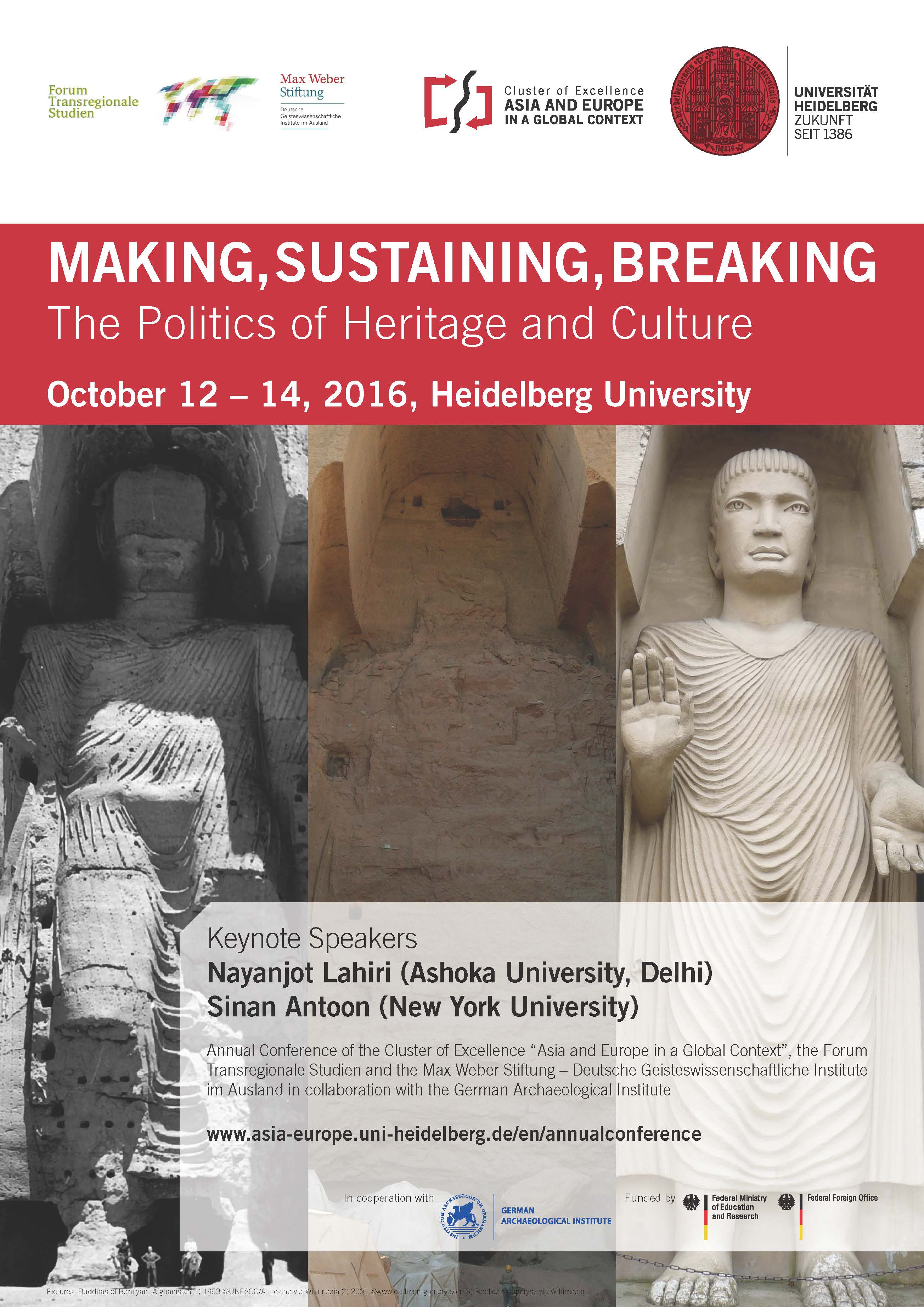
The deliberations of the conference addressed some of the urgent questions that surround heritage as a political and cultural issue at a historical juncture when the idea of culture is being drawn into a field of intense contestation. While in certain intellectual circles and scholarly discussions culture is slowly but steadily being uncoupled from the nation, these impulses are at the same time being countered by moves to reinforce – even reinvent – national identities as culturally homogenous. As societies confront their transcultural pasts, the concept of a monolithic, integrative heritage is not only becoming increasingly untenable, it is turning into a site of conflict. Ruptures induced by the spatial and cultural displacements that come with modernity and contemporary globalization have in turn meant a return to notions of an ancient, untainted civilizational identity in many regions of the world. Such positions cut across the domains of politics and civil society – they include political and institutional authorities as well as scholarly practices, have at the same time found articulation in religious extremism and xenophobia embodied by fundamentalist groups, themselves a modern, transnational phenomenon. Fissures within public spheres that cut across national boundaries in an increasingly connected world have brought questions of cultural heritage to the heart of any engagement with the tangled relationship between concepts of culture and the nation-state.
Heritage here, conceived of as the historical imagination of modern nations, encompasses built structures, artefacts, images, texts and practices. One component of the conference will be to explore the nexus between objects canonized as heritage, transcultural conceptual formations the institutions entrusted with its care, and the disciplines – archaeology, art history, history, literature, philology, anthropology, architecture and conservation studies as well as studies of media and tourism – all of which produce and order knowledge about the uses and meanings of heritage. Contributions to the conference are invited to unravel the contestations surrounding the production of heritage as a concept and practice in the past and present. As new nation states come into being and older ones continue to redefine themselves, the processes by which the past is selectively celebrated and grafted to the aspirations of nations call for a close examination. If heritage is “predatory” (Arjun Appadurai) in that certain forms of remembering are predicated on the elimination of other memories, under what circumstances does this happen? What are the languages brought forth by multiple, competing versions of the past that signify the politicization of culture? Do transculturally shaped identities and social formations in flux generate a yearning for (imagined) stability through a search for “origins” or the recuperation of “purity”?
As an expression of identity, a source of confidence or anxiety, a subject of governance or site of consumption, alternatively as an archive of knowledge and subject of scholarly research, heritage generates imperatives to safeguard, retrieve, preserve, shed and destroy. A second thematic focus of the conference invites panel proposals to discuss each of these aspects that form part of a dynamic of making, saving and breaking. Is conservation also a form of redefinition or an act of transformation that reconfigures an object? How do specific concepts of value and authenticity shape decisions and measures to preserve and to archive? When contemporary cultures of the spectacle enabled by the power of digital and other technologies of simulation create “hyperreal” (Baudrillard) heritage sites to replace the real ones, does the copy democratize the original, possibly by making it redundant?
The third element of the triad is the destruction of heritage – of historical sites, artefacts and archives – in the name of revolution or historical justice, religious fundamentalism, ethnic cleansing, alternatively in conjunction with illicit trade, plunder or natural disaster. The discussion of iconoclasm – both in the past and the present – with a view to making sense of the tangled relationship between the act of destruction and the ways it comes to be signified, and of understanding the place of iconoclasm in collective imaginations will form a third important plank of the conference.
The Annual Conference 2016 was a collaborative enterprise of the Cluster of Excellence “Asia and Europe in a Global Context” at Heidelberg University, the Forum Transregionale Studien, the Max Weber Stiftung- Deutsche Geisteswissenschaftliche Institute im Ausland, and the German Archaeological Institute in Berlin. The main conference took place over two and a half days at the Karl Jaspers Centre in Heidelberg. It was followed by a roundtable discussion in Berlin, at a later date, comprising distinguished speakers across disciplines and including practicing individuals in the field of heritage and curating. The Heidelberg segment of the conference consisted of panels following different formats: the morning panels (2 each on October 13 and 14) were plenary sessions devoted to broader themes of the conference, while the afternoon featured parallel sections, with panels in different formats, with a view to foster more intensive dialogic exchange. Two keynote addresses were held in the evenings of October 12 and 13, and a concluding discussion in plenum for the afternoon of October 14.
Program
Wednesday, October 12, 2016
18:00 Alte Aula
Welcome: Barbara Mittler (Heidelberg) and Andreas Eckert (Berlin)
Introduction to the Conference: Monica Juneja (Heidelberg)
Keynote address: Nayanjot Lahiri (Delhi)
Thursday, October 13, 2016
09:00 Morning Session: Heritage dynamics. Politics of authentication and aesthetics of persuasion
Mattijs van de Port (Utrecht) / Markus Balkenhol (Utrecht)
Heritage Dynamics: Politics of Authentication and Aesthetics of Persuasion
Katharina Rode (Heidelberg)
National Treasures for Modern Japan – Protective Legislation, Issues of Cultural Authenticity and the Necessity for a Nationwide Cultural Consciousness
Annalisa Butticci (Utrecht)
The Making of a Transcultural Divinity. The Politics of Religious Heritage in the Gold Coast of Ghana
Chair: Birgit Meyer (Utrecht/Berlin)
10:30 Coffee Break
11:00 Morning Session II: Cultural Heritage – Beyond the Salvage Paradigm. Conceptual Formations, Methodological Approaches, Architectural Case Studies
Michael Falser (Heidelberg)
Cultural Heritage as Civilizing Mission and the Transcultural Pathways of Angkor Wat
Gamini Wijesuriya (Rome)
Capacity Building Activities of ICCROM: Reaching Wider Audiences and Focusing on Traditional Knowledge Systems
Miles Glendinning (Edinburgh)
Mass Housing as Cultural Heritage? The Differing Challenges of Reception and Valorisation in Eastern Asia and the West
Chair: Ralph Bodenstein (Berlin)
12:30 Lunch Break
13:30 Afternoon Session Ia: Contested Spaces and Places: Ruins of the Past and the Presence of Memories
Joseph Maran / Thomas Meier (Heidelberg)
Introduction
Rafi Greenberg (Tel Aviv)
Archaeology and the Creation of Antiquities
n.n.
Chair: Joseph Maran (Heidelberg)
Afternoon Session Ib: Politics of Heritage Making: German Archaeology in the Eastern Mediterranean c. 1900
Claudia Mächler (Heidelberg)
Unexpected Monuments or how to handle with Cultural Heritage
Reinhard Senff (Athen)
The excavations at Olympia: In Search for the Ideal Greek Sanctuary
Jennifer Pochodzalla (Heidelberg)
The Mshattā Façade, Ottoman Heritage Politics and the Resistance of Osman Hamdi Bey
Katharina Steudtner (Berlin) / Duygu Göcmen (Berlin)
‘Breaking before Making’. Early Conservation Concepts for Archaeological Sites on the West Coast of Turkey
Chair: Diamantis Panagiotopoulos (Heidelberg)
Afternoon Session Ic: Mediating Public Heritage
Patrick Wertmann (Beijing)
Creating a Common National Identity in China through the Popularization of Archaeological Heritage – The Role of Media and Popular Sciences
Nadia von Maltzahn (Beirut)
Heritage, Tourism, and National Pride: The Baalbeck Festival in Lebanon
Ahmed Adam (Khartoum)
Measuring Extent of Economic Benefits of Archaeological Heritage Sites in Sudan – Begrawia as a Case Study
Harald Fuess (Heidelberg)
Industrial Ruins as Cultural Heritage in Japan: Economic Growth Nostalgia in the Age of Abenomics
Chair: Carsten Wergin (Heidelberg)
15:00 Coffee Break
15:30 Afternoon Session IIa: Heritage, Decolonization, Nation-State
William Carruthers (London)
Field Notes: Archaeology, Heritage and the Decolonising Nation-State
Sadiah Boonstra (London)
Changing Wayang Scenes. The Politics of Heritage Formation in Colonial and Postcolonial Indonesia
Umut Azak (Istanbul)
Canonization of the Suppressed Iconography: Shaping the Memory of the Single-Party Period during the AKP Period in Turkey
Nikolas Drosos (Columbia)
Reconstructing Old Warsaw / Constructing Socialism
Chair: Philipp Stockhammer (München/Heidelberg)
Afternoon Session IIb: Ex Oriente Lux? Classical Music in the Hands of Chinese Musicians—Crisis, Challenge, Chance?
Roundtable Discussion
Inga Mai Groote, Annette Hornbacher, Hsin-yi Li, Barbara Mittler, Dorothea Redepenning
Chair: Barbara Mittler (Heidelberg)
Afternoon Session IIc: Archives of Heritage
Garima Dhabhai (Yale/Delhi)
Excavating the City: Metro Rail Construction and Imagination of ‘Past’ in Contemporary Jaipur
Banu Karaca (Berlin)
Lost, not Found?: Missing Provenance, ‘Lost’ Artworks, and the Making of Heritage in Turkey
Biri Kudzai (Zimbabwe)
‘Written Creeds in the Heart’?: Challenges of African Oral Cultures in Negotiating Contemporary Ethical Challenges in Zimbabwe
Susanne Marten-Finnis (Portsmouth)
Custodians of the Jewish Textual Tradition. The Heritage of a People Apart Curation and Retrieval
Saumya Agarwal (Heidelberg)
Conflicting Modernities: Preserving the Wall Paintings of Shekhawati
Chair: Hannah Baader (Florenz/Berlin)
18:00 Keynote Speech
Sinan Antoon (New York/Berlin)
Chair: Georges Khalil (Berlin)
Friday, October 14, 2016
09:00 Morning Session I: »Stunde Null« - Capacity Building and the Politics of Archeology in Times of Crisis
Frederike Fless (Berlin)
tba
Claudia Bührig (Berlin) / Frank Andraschko (Hamburg)
Sustainable Development for Heritage and Nature Protection. Transfer and Communication of Cultural and Natural Heritage for Children and Young Adults
Hanna Sonbol (Kairo)
tba
Chair: Georges Khalil (Berlin)
10:30 Coffee Break
11:00 Morning Session II: Models of Native Participation versus Claims of Repatriation. Options and Potentials in the Making of the Humboldt Forum Berlin
Viola König (Berlin)
Models of Native Participation versus Claims of Repatriation. Options and Potentials in the Making of the Humboldt Forum Berlin
Susanne Leeb (Lüneburg)
The Temporality of Heritage
Comment: Henry Keazor (Heidelberg)
Chair: Monica Juneja (Heidelberg)
12:30 Lunch Break
13:30 Afternoon Session Ia: Rupture, Past, Mediation
Omar Al-Ghazzi (Sheffield)
The Mediation of Al-Andalus in 2013 and the Arab Transnational Crisis of Meaning-Making
Helena Nassif (Marburg)
Fictional Paradise: Moral Representations of the Damascene Courtyard House
Ana Milošević (Leuven)
National Reconciliation or Rupture with the Past: De-Communisation of Yugoslav Memories in Serbian Politics
Katrin Stoll (Warschau)
On the Culturalization of Political and Social Issues
Chair: Daniel König (Heidelberg)
Afternoon Session Ib: Selective Amnesia. Exploring and Exploiting Istanbul’s Past
Martin Bachmann (Istanbul) / Katja Piesker (Berlin)
Introduction
Martin Bachmann (Istanbul) / Richard Wittmann (Istanbul)
First Case Study
Katja Piesker (Berlin) / Karin Schuitema (Istanbul)
Second Case Study
Discussants: Banu Karaca (Berlin) / İrem Maro Kırış (Istanbul)
Chair: Katja Piesker (Berlin)
Afternoon Session Ic: Heritage in Times of Crisis: Transcultural Approaches to Reconstruction and Revaluation in Post-Earthquake Nepal
Dina Bangdel (Doha)
Conservation or Ritual Renewal: Contested Spaces of Shantipur's Early 20th Century Wall Paintings in Post-Earthquake Nepal
Katharina Weiler (Heidelberg)
Patan Darbār Square: Restoration and Rebuilding of Cultural Heritage after the Earthquake of 2015
Axel Michaels / Manik Bajracharya (Heidelberg)
Historical Approaches to Heritage Pre/Restauration in Post-Earthquake Kathmandu
Roundtable Discussion
Manik Bajracharya, Dina Bangdel, Marlene Harles, Axel Michaels, Sheelasha Rajbhandari, Davide Torri, Katharina Weiler
Chair: Christiane Brosius (Heidelberg)
15:00 Coffee Break
15:30 Afternoon Session II
Concluding Roundtable Discussion
Birgit Meyer (Utrecht), Markus Hilgert (Berlin), Rudolf Wagner (Heidelberg), Aloka Parasher-Sen (Hyderabad), Hannah Baader (Berlin)
Chair: Philipp von Rummel (Berlin)
______________________________________________________________
The conference is funded by the Bundesministerium für Bildung und Forschung (BMBF) and the Auswärtiges Amt.
Image credits: Buddhas of Bamiyan, Afghanistan (1. Statue photographed in 1963.©UNESCO/A Lezine via Wikimedia Commons (https://commons.wikimedia.org/w/index.php?curid=7069348); 2. Reconstuction efforts after the Buddha's were demolished by the Taliban in 2001. ©Carl Montgomery (www.carlmontgomery.com); 3. Replica at Arkady Fiedler Museum in Puszczykowo. ©Jsporysz via Wikimedia Commons (https://commons.wikimedia.org/w/index.php?curid=26106699)

